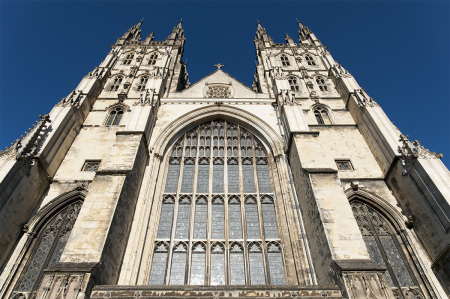Church of England’s net-zero carbon push risks damaging ancient cathedral’s artifacts

A historic church in England faces severe structural and aesthetic damage, putting medieval artifacts at risk due to the diocese's refusal to replace broken-down gas boilers so it can adhere to the Church of England's strict net-zero carbon policy.
The historic church of St. John the Baptist in Tideswell, Derbyshire, England, also known as The Cathedral of the Peak, has been left without heating since October 2023 when three gas boilers stopped during a storm flood, sources told The Telegraph.
Although the flooding caused by Storm Babet was the initial trigger of the problems, the CofE environmental directives have thwarted subsequent efforts to replace these boilers.
Churchwarden Peter Robinson and Assistant Churchwarden Mike Burrell told the newspaper the Diocese of Derby denied all requests to replace the old gas boilers. The wardens' frustrations are compounded by the lack of viable green alternatives suitable for the ancient structure.
In February 2020, the CofE General Synod voted for the denomination to achieve net-zero carbon emissions by 2030, calling the "global climate emergency" a "fundamental injustice." An action plan was approved in 2022.
The prolonged cold has permeated the church walls, causing dampness that threatens the integrity of historic carvings and valuable books, the overseers say. The congregation, many of whom are elderly, have endured services in extreme cold, dressed in layers and using insufficient personal heaters to find some relief.
"We are still in an absolute stalemate. Of course, what is concerning us all is the duty of care towards the parishioners. Quite a lot of them are over 80. I am 92," parishioner Joy Bramley told The Telegraph.
"But we are more than concerned about the fabric of the church because it stood there for all these hundreds of years. It's now getting to look quite damp and it's affecting some of the beautiful carvings."
With the summer coming to a close, the congregation is not looking forward to what the winter months might bring after what they endured last winter. Visitor numbers have drastically fallen from the annual high of 33,000. The harsh conditions have deterred tourists and reduced the church's income.
"You should have seen us all: mufflers, two layers of coats, boots, socks. We did try to put little heaters into one or two pews but all they did was warm our toes slightly because the building is so vast," Bramley said.
"People come to weddings and to funerals, and they're all cold. Imagine going to a funeral, being frightfully sad and having to sit in a cold, cold church."
The church has explored various heating technologies, including biomass, solar, electric and air source heat pumps, Robinson said. However, logistical challenges and inadequate infrastructure, such as insufficient village electricity supply, have stymied these alternatives.
The National Grid told the church leaders the power supply in the town will not accommodate a strong electric heating system in the church. Yet diocese officials have suggested that direct negotiations with the Grid might yield a different outcome.
Between 2023 and 2031, the Church of England plans to distribute £190 million ($250 million) to help churches reduce carbon emissions, according to CofE's "Routemap to Net Zero Carbon by 2030."
"The 2030 target is hugely ambitious, but the process is as important as the target," the document notes. "Every month or year that we delay our progress towards net zero carbon will lead to suffering and even death for our human neighbours and the rest of God's creation. It is thus a matter of justice that we act now and is a key part of our obedience to God's call to care for creation that the transition to net zero carbon takes place as rapidly as possible."






















